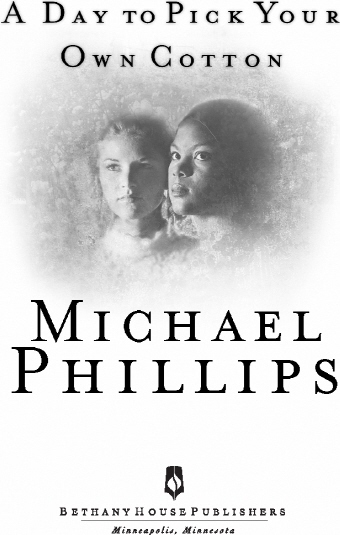A Day to Pick Your Own Cotton


A D
AY TO
P
ICK
Y
OUR
O
WN
C
OTTON

Books by Michael Phillips
Is Jesus Coming Back As Soon As We Think?
Destiny Junction
•
Kings Crossroads
Make Me Like Jesus
•
God, A Good Father
Jesus, An Obedient Son
Best Friends for Life
(with Judy Phillips)
George MacDonald: Scotland’s Beloved Storyteller
Rift in Time
•
Hidden in Time
Your Life in Christ
(George MacDonald)
The Truth in Jesus
(George MacDonald)
A
MERICAN
D
REAMS
Dream of Freedom
•
Dream of Life
•
Dream of Love
T
HE
S
ECRET OF THE
R
OSE
The Eleventh Hour
•
A Rose Remembered
Escape to Freedom
•
Dawn of Liberty
S
HENANDOAH
S
ISTERS
Angels Watching Over Me
A Day to Pick Your Own Cotton
The Color of Your Skin Ain’t the Color of Your Heart
Together Is All We Need
C
AROLINA
C
OUSINS
A Perilous Proposal
•
The Soldier ’s Lady
Never Too Late
•
Miss Katie’s Rosewood

A Day to Pick Your Own Cotton
Copyright © 2003
Michael Phillips
Cover photo of girls by David Bailey
Cover design by The DesignWorks Group
All rights reserved. No part of this publication may be reproduced, stored in a retrieval system, or transmitted in any form or by any means—electronic, mechanical, photocopying, recording, or otherwise—without the prior written permission of the publisher. The only exception is brief quotations in printed reviews.
Uncle Remus stories are the creation of Joel Chandler Harris (1848–1908).
Published by Bethany House Publishers
11400 Hampshire Avenue South
Bloomington, Minnesota 55438
Bethany House Publishers is a division of
Baker Publishing Group, Grand Rapids, Michigan.
Printed in the United States of America
ISBN 978-0-7642-2701-1
Library of Congress Cataloging-in-Publication Data
Phillips, Michael R., 1946–
A day to pick your own cotton / by Michael Phillips.
p. cm. — (Shenandoah sisters)
ISBN 0-7642-2706-8 (hardback : alk. paper) — ISBN 0-7642-2701-7 (pbk.)
1. North Carolina—Fiction. 2. Female friendship—Fiction. 3. Plantation life— Fiction. 4. Race relations—Fiction. 5. Teenage girls—Fiction. 6. Reconstruction— Fiction. 7. Orphans—Fiction. I. Title. II. Series: Phillips, Michael R., 1946- , Shenandoah sisters.
PS3566.H492D396 2003
813'.52—dc21
2003001434
MICHAEL PHILLIPS is one of the premier fiction authors publishing in the CBA marketplace. He has authored more than fifty books, with total sales exceeding six million copies. He is also well known as the editor of the popular George MacDonald Classics series. Michael and his wife, Judy, have three grown sons and make their home in Eureka, California.
Contents

I
RECKON IT’D BE ALMIGHTY PRESUMING OF ME TO
guess what was going on inside the brain of the lady who ran the general store and post office in the town of Greens Crossing in Shenandoah County, North Carolina. But I do know what was going on inside mine.
If we can’t fool Mrs. Hammond, we’ll go hungry. Or worse—they’ll come and take us away
.
Elfrida Hammond wasn’t the kind of lady a body could draw a good bead on just from looking at her. Except for one thing, that is. She had a grum expression set permanent-like on her face. Suspicious, that’s what I’d call the lady, her eyes a little squinty. I’d only seen her once before, and that was from an upstairs window, where I hid when she came to the house. But just from listening I could tell that hers wasn’t a cheerful kind of voice.
It wasn’t my house. I’ll explain that later. But what I was about to say was that she wasn’t smiling then, so I doubted she was smiling today. Fact is, I don’t know if Elfrida Hammond ever smiled.
Who can say what she was thinking, or whether she saw the wagon pull up in front of her store, or what went through her mind when the door opened and the little bell above it tinkled to announce that she had a customer. But I do know that when she turned to greet the young lady who had just walked in, her eyes narrowed yet a little more.
“Kathleen …” she said in a slow, worrisome tone that trailed off and then went up at the end like a question.
“Good morning, Mrs. Hammond,” said the girl. She was only fifteen, and had only turned that about a month before. But she had a special reason for trying to sound more grown up than her age.
“I see your mama’s not with you.”
“No, ma’am. She couldn’t come to town today. So I came instead. I want to get some supplies, Mrs. Hammond. Here’s the list of what we need.”
She handed a piece of paper over the counter. The lady took it and looked it over like a schoolmarm grading a test.
“There are a lot of things here, Kathleen,” she said.
“Yes, ma’am.”
“Did you tell your mother what I told you about her account?”
“We talked about it, ma’am. She said to tell you she promised she’d get it taken care of real soon, and asked if you could just help her out a little longer.”
“I declare,” said the lady, “I don’t know what she expects me to do.”
Mrs. Hammond looked at the list again, then at Katie, then glanced outside her shop where the wagon sat. Her eyes narrowed a little more.
“Who’s that darkie you got with you?” she asked.
“She’s my—er, one of our house slaves.”
“I’ve never seen her before. Is she Beulah’s pickaninny?”
“No, ma’am.”
“She’s ugly as sin.”